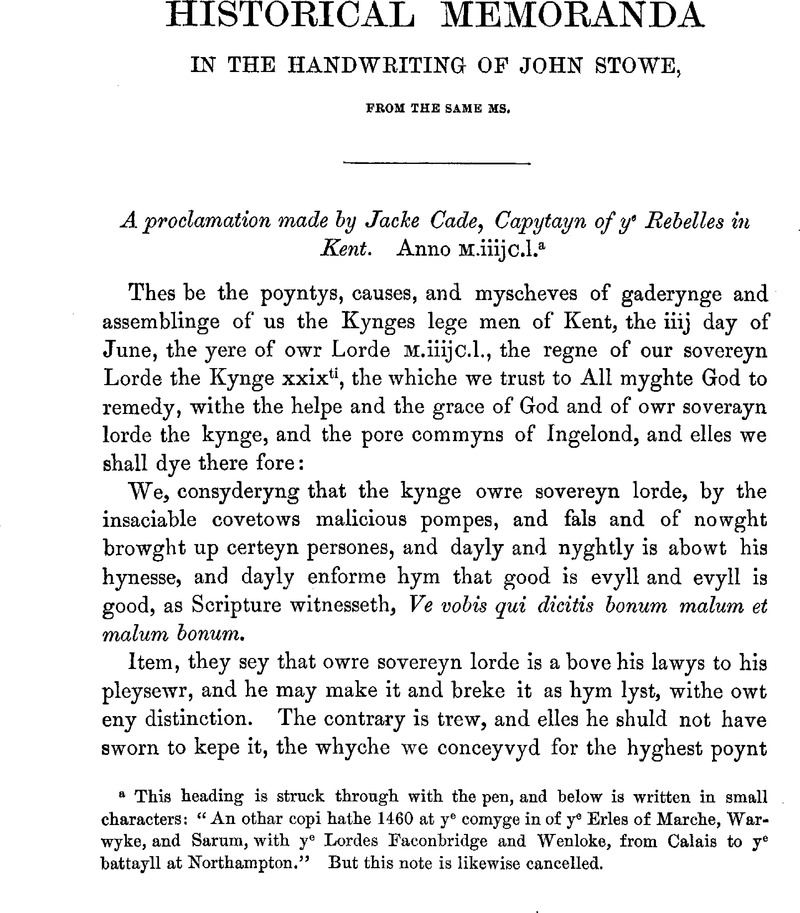No CrossRef data available.
Article contents
Historical Memoranda in the Handwriting of John Stowe, from the same Ms
Published online by Cambridge University Press: 24 December 2009
Abstract

- Type
- Stowe's Memoranda
- Information
- Copyright
- Copyright © Royal Historical Society 1881
References
page 94 note a This heading is struck through with the pen, and helow is written in small characters: “An othar copi hathe 1460 at ye comyge in of ye Erles of Marche, Warwyke, and Sarum, with ye Lordes Faconbridge and Wenloke, from Calais to ye battayll at Northampton.” But this note is likewise cancelled.
page 95 note a Sic MS.
page 97 note a Sic.
page 98 note a “same.” So in MS. for “some.”
page 98 note b So in MS.
page 99 note a Another version of this satirical dirge has been printed by Ritson in his Ancient Songs and Ballads (p. 101, Hazlitt's edition), and by Wright in his Political Poems (ii. 232), from the contemporary Cottonian MS. Vespasian, B. xvi. f. 1. But it consists only of nine stanzas, of which the first seven agree pretty nearly with the first seven in this transcript.
page 99 note b Nicholas, of the Tower, was the name of the ship by which the Duke of Suffolk's vessel was stopped upon the sea.
page 99 note c The Cott. version reads: “that he ne passede that hour.”
page 100 note a Richard Beauchamp, who was translated to Salisbury the same year.
page 100 note b The Bishop of Chester, i. e. of Coventry and Lichfield, at the time was William Booth.
page 100 note c William Ayscough, Bishop of Salisbury, who was murdered soon after Suffolk, 29 June, 1450. He was clerk of the Council to Henry VI.
page 100 note d Reginald Butler, or Boulers, who was made Bishop of Hereford, 23 Dec. 1450.
page 100 note e John Lowe.
page 100 note f John Stanbury, a Carmelite, Provost of Eton, who was nominated by the King to the Bishopric of Norwich in 1445, but set aside by the Pope.
page 100 note g John Carpenter.
page 100 note h So in MS.
page 100 note i John Kemp, Cardinal Archbishop of York.
page 100 note k Thomas, Bishop of St. Asaph, whose surname is not known.
page 101 note a He was Bishop of Norwich at this time, or else this is a namesake. A little later (1467) we find that a Walter Hert (undoubtedly the same name) was a Prebendary of St. Paul's.
page 101 note b The Cott. MS. here reads “The Abbot of Westmynstre.”
page 101 note c John Delabere.
page 101 note d Adam Moleyns, Bishop of Chichester, who was murdered in January 1450.
page 101 note e He was associated with Bishop Moleyns in delivering up Maine to the French.
page 101 note f Nicholas Close.
page 101 note g “Dwelle.” Probably a transcriber's error for “Dudley.” The Cott. MS. reads: “The Baron of Dudley, with grete mornynge.”
page 101 note h Thomas Daniel, one of the most unpopular of the King's councillors.
page 101 note i John Trerilian, alluded to as “the Cornish Chough” in another political poem.
page 102 note a So in MS., but qu. Slegge? See p. 98.
page 103 note a “Pelli meas consumptis carnibns adhæsit os.”—Job xix. 20.
page 103 note b Probably John Judde, an officer of the ordnance to Hemy VI. See Stevenson's Wars of the English in Prance, , ii. 512.Google Scholar
page 103 note c This is a most extraordinary statement, as the Duke of Gloucester, whether murdered or not, certainly died in his bed.
page 103 note d “Orde'tes a'i'e,” MS.; qu. “ardentes”? I can find no corresponding psalm or antiphon.




